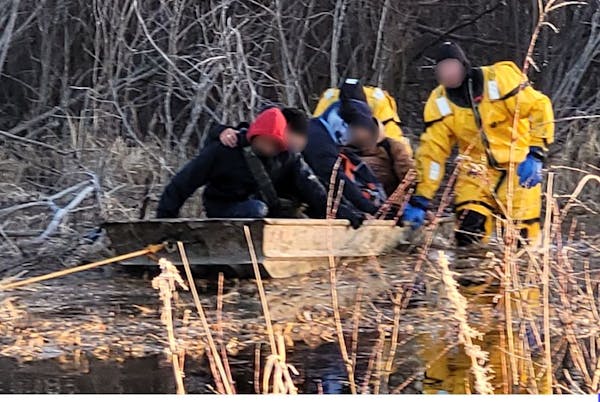The rescue from a flooded bog last week of nine men who had illegally crossed into Minnesota from Canada underscores a dramatic increase in undocumented immigrants coming into the United States across the northern border.
According to U.S. Customs and Border Protection (CBP), agents have encountered 100 migrants in the Grand Forks Sector since the start of the 2023 fiscal year on Oct. 1. That compares with 81 encounters in all of fiscal 2022 and 90 in fiscal 2021 in the sector, which encompasses the international border in North Dakota and Minnesota.
The 100 migrant encounters are among 3,830 encounters along the entire northern U.S. border this fiscal year, a 41% rise over all of 2022.
Recent news reports have highlighted Border Patrol agents encountering thousands of migrants in recent months, most of them from Mexico, trekking over the Canadian border into the northeastern U.S.
But even in the Border Patrol's quieter Grand Forks Sector, the agency is looking to add agents amid a surge of unlawful crossings.
"While the northern border in the past may not be the haven people were looking for, what they're realizing is that maybe the southern border is too difficult to cross, but if I go to the northern border, it'll be easier," said CBP spokesman Steven Bansbach. "And they're finding it's not, because it has its own weather-related problems, as well as officers that are going to find you."
Statistics show that 70% of Border Patrol encounters in the region this year have been with Mexican migrants. Bansbach noted that the northern U.S. border, which spans more than 5,000 miles, has 1,900 border agents compared with 16,500 along the much shorter southern border.
"You have all those spots in between [the legal ports of entry] — there is no fence, so it's all just land," he said. Some think the northern border is easier, he said, and that "you just have to walk so far and you'll be in the U.S. — and the 'so far' turns out to be a lot more than a couple minutes here and there."
Early Tuesday morning last week, according to CBP officials, an emergency call was made from Lost River State Forest near Warroad, Minn., that went to the Royal Canadian Mounted Police. The Canadians alerted Minnesota authorities, prompting several dozen people from local law enforcement agencies to rush to the scene.
Jared Berg, acting patrol agent in charge of the Border Patrol's Warroad Station, said authorities found two men next to the road suffering from hypothermia. The agents and rescuers found seven others stuck in a swampy marsh. Authorities crossed a ditch in ATVs and rescued them in boats.
"It's a harsh environment this time of year if you don't have the proper equipment and clothing," Berg said. "Some of them had some winter coats and winter-related gear, but once they were wet it didn't help at all."
The CBP reported that seven of the men were Mexican citizens without immigration documents to enter the U.S. legally, and they were transferred to the custody of U.S. Immigration and Customs Enforcement. Two others, who also lacked immigration papers, received medical care for exposure; authorities were unable to determine their nationality.
Berg said most of the encounters on the Minnesota border aren't search-and-rescue operations. He said the Grand Forks Sector will have more job openings to fill staffing needs but declined to say how many.

Five Minnesota political figures to watch after the 2024 election

This Minnesota county voted blue for nearly 100 years — until Trump. Can Democrats win it back?

How Minnesota House Republicans ended the DFL's state government trifecta
Project 2025 platform proposal aims to allow mining in Boundary Waters watershed

